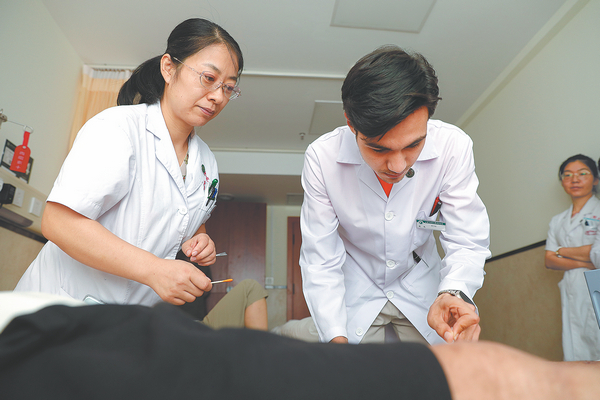More Hungarians choose to undergo TCM therapy


LANZHOU/BUDAPEST — Jozsef Frenyo, a senior Hungarian biology teacher, recovered from hearing loss after several visits to a traditional Chinese medicine center near Heroes' Square in the Hungarian capital of Budapest.
"Doctors here cured my old malady. And my hearing is now getting better," says 78-year-old Frenyo.
Practitioners of TCM use various approaches, such as acupuncture, cupping and herbal medicine, to address health problems. These practices spread to the world via the ancient Silk Road more than 2,000 years ago.
The center, named the Qihuang Traditional Chinese Medicine Center of Hungary, was set up by Northwest China's Gansu provincial health commission in 2016. It has been operating with the help of teams of Chinese doctors sent to Hungary to provide medical assistance.
Gansu province is a major TCM hub in China and has a long history of growing TCM herbs. Since the Belt and Road Initiative was proposed in 2013, Gansu has signed cooperation contracts with 12 countries, including Belarus, Kyrgyzstan and Hungary, and built 16 TCM education, research and treatment facilities overseas.
Frenyo has long suffered from hearing impairment and has visited many hospitals in Hungary over the past few years, but with little success.
"I was told by physicians that my hearing problem couldn't be cured due to my old age," he recalls. Before seeking help from TCM, he had almost given up hope.
However, after receiving several acupuncture treatments from TCM expert Zhang Haifang, Frenyo is now able to communicate with others without the help of external hearing aids.
"The center is popular in Hungary," says Zhang, who has treated several hundred Hungarian patients since she came to the center in January.
Chen Zhen, president of the center, says that TCM gained increasing acceptance among Hungarians after it played an important role in alleviating the symptoms of the COVID-19 pandemic in China and abroad.
As more Chinese TCM doctors like Zhang go abroad to practice, they help bring the benefits of the ancient Chinese medical system to more people around the world.
During the 14th Five-Year Plan period (2021-25), China aims to jointly establish 30 high-quality TCM centers with countries involved in the Belt and Road Initiative, according to a plan issued by central government agencies in 2022.
At the Qihuang Traditional Chinese Medicine Center of Thailand, about 90 percent of the patients are Thais.
Rungrawan Wiwatpiyawong, president of the center, emphasizes that many Chinese Thais view TCM treatments as their first choice for maintaining good health.
"TCM did not take root in Thailand in a day," says Rungrawan, herself a Chinese Thai. "It spread with the footprints of Chinese immigrants over the past few centuries and has proved its value."
To further promote TCM in Thailand, Rungrawan established a company called Tang Ming Green Health Co, which facilitated the approval of 90 kinds of proprietary Chinese medicines and 350 kinds of TCM granules by the Thai government.
"With official permission, I believe that the TCM industry and health products will have greater potential in the future," she says.
Wang Xuejun, a professor at the Gansu University of Chinese Medicine, highlights the unique perspective of TCM on life and fitness, as well as the prevention and treatment of diseases, during its long history of development and innovation.
"It represents the spiritual core of fine traditional Chinese culture, and has generated a broad and strong international resonance," he says.
Convinced of TCM's benefits, a growing number of overseas students and practitioners, especially those of the younger generation, have come to China to experience and learn TCM therapies.
Bakhtiyor from Tajikistan is currently a junior student at the Gansu University of Chinese Medicine, which has so far trained students from 11 countries, including the Republic of Korea, Kazakhstan and Laos.
During the past semester, Bakhtiyor devoted most of his spare time to practicing acupuncture techniques.
"It was hard," he says. "There are so many acupuncture points in the human body, and different points require different kinds of needles."
Taking pride in his growing proficiency in acupuncture, Bakhtiyor hopes to pursue a postgraduate degree and work in a TCM clinic in China after graduation.
According to statistics from the National Administration of Traditional Chinese Medicine, TCM has spread to 196 countries and regions, gaining worldwide recognition.
China is continuing its efforts to introduce TCM more fully to the world, especially in countries and regions participating in the Belt and Road Initiative.
As cooperation and exchanges have intensified, TCM has contributed to improving the well-being of people around the world, while promoting culture, medicine and friendship worldwide, Chen adds.
MOST POPULAR
- 1 China Daily's 'Shopping in China' platform appeals to intl audiences
- 2 China updates Catalogue of Encouraged Industries for Foreign Investment
- 3 Policies concerning expats, foreign enterprises in December 2025
- 4 China becomes the world's fourth manufacturing power
- 5 China ascends global higher education ranking







